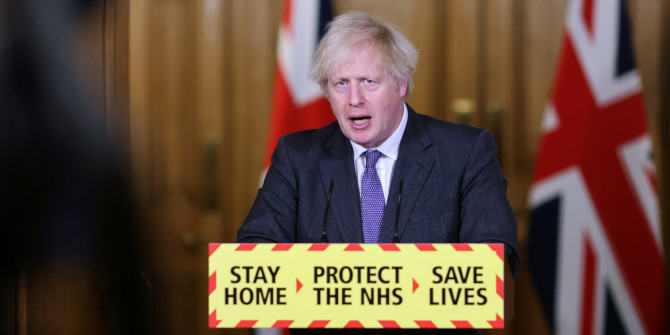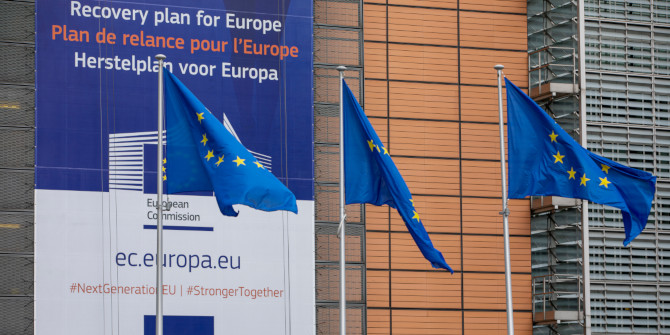Most professional sport in Europe has taken place in empty stadiums since the start of the Covid-19 pandemic. However, with the proposed return of spectators upon us, Connor Penfold, Paul Kitchin and Paul Darby argue the sports industry must facilitate a disability-inclusive restart for spectator sports. Drawing on a recent study, they outline a series of recommendations that could be used by stadium operators to ensure the pandemic does not lead to further neglect of the needs and rights of disabled people in the context of sport.
During the Covid-19 pandemic disabled people have been disproportionally impacted. A recent survey of the lived realities of disabled people conducted by Inclusion London concluded that they have been abandoned, forgotten and ignored by policymakers, local authorities and other service providers.
The fact that disabled people accounted for six in ten Covid-19 related deaths last year in England highlights the long-standing structural inequalities and discrimination disabled people face today. The UK government’s response to the Covid-19 pandemic, coupled with over a decade of austerity-driven public, welfare, and healthcare service cuts reinforces the perception that disabled people are considered to be second-class citizens. This trend of ill-treatment is manifest across multiple sectors including education, healthcare, and, as we focus on in this article, sport and leisure.
Covid-19, disabled people and the return of spectators to sport stadiums
The marginalisation of disabled people has long been reflected in the context of sport. Their access needs and rights to full participation in sport and physical activity settings have often been an afterthought for policymakers. But this has become particularly pronounced during the current pandemic. For instance, the 2020/21 Annual Disability and Activity Survey revealed that the number of disabled people who said they were physically active had fallen to 34%, compared to 41% in the previous year, and while activity figures for the non-disabled population are also down, an individual with one or more impairments is less active.
Leading Paralympic athlete, Sophie Carrigill, has argued this decline is due to the needs of disabled people being ignored during lockdown. In addition to participation, the various lockdowns have negatively impacted opportunities to attend live sporting events as spectators. Unlike the impacts to mental and physical health associated with declining physical activity rates amongst disabled people, the implications of stadium closures have received considerably less media and academic attention.

Santiago Bernabéu Stadium, Credit: Vienna Reyes on Unsplash
As such, we believe it is important to draw attention to this issue because spectating at live sports events offers disabled people numerous psychological and social benefits, including increased mental wellbeing, feelings of belonging and a shared identity. This is why any formal plan to return spectators to stadiums must be disability-inclusive. The extent to which this will be the case in relation to football will likely be undermined by the fact that disabled people’s experiences in this setting are often unsatisfactory, characterised as they are by numerous barriers.
These barriers are structural, social and psychological and frequently manifest through a lack of essential facilities such as disabled parking bays, wheelchair accessible spaces, raised viewing platforms, and accessible toilets, as well as inaccessible ticketing services, poorly trained matchday staff members, and the attitudes and behaviours of other (non-disabled) spectators. Moreover, with half of the 600 disabled sports fans surveyed by the advocacy group Level Playing Field (LPF) expressing anxieties about returning to football stadiums because of safety concerns, it is vital for football authorities to ensure the safe return of all supporters when the time is right.
To achieve a disability-inclusive return, the nature of football stadiums needs to be carefully considered and strategies for managing these spaces must not simply return to their pre-Covid-19 ways of operation. Disabled fan advocacy organisations such as LPF and the Centre for Access to Football in Europe (CAFE) have both published reports regarding the safe return of spectators to football stadiums. The recommendations issued in these reports have impacted on the Sports Grounds Safety Authority’s (SGSA) social distancing guidelines which ensure that all disabled people are not classified as vulnerable within the context of returning to sport stadiums. On the premise of these publications, we have published a recent study which builds upon the work of LPF and CAFE to deliver a series of recommendations that could be used by stadium operators to facilitate a disability-inclusive return.
A disability-inclusive restart
Our first recommendation is for facility managers to implement the necessary changes put forth by the Department for Digital Culture, Media & Sport guidelines for the safe return of fans. These guidelines, developed in conjunction with the SGSA, must be validated against SGSA guidance and thus provide the most inclusive detailed protocols about how stadium operators can increase competition venue capacities safely. Indeed, the inclusion of disabled people in sport settings such as football stadiums is protected internationally under Article 30 of the Convention on the Rights of Persons with Disabilities which should not be circumvented by Covid-19. We advise decision makers to be inclusive, holistic and consistent in their provision for disabled supporters, or risk repeating many of the discriminatory practices that existed prior to Covid-19 induced lockdowns.
Second, we suggest facility managers should ensure that all communications are delivered using multiple and accessible modes of delivery (which include transcripts and captioning, sign language interpretation, amongst other modes). Furthermore, we recommend that disabled people are actively consulted in the formulation of these communication strategies. In this sense, we are advocating for football clubs and governing bodies to engage in meaningful consultation and two-way communication with disabled people.
Our final recommendation for the safe return of disabled fans is arguably the most contentious. We believe that the facility space for all attendees, including existing spaces designated for those with a disability, will need to be reconfigured when fans return to the stadium in order to make it more Covid-19 secure. This carries resource implications for sporting organisations, who like many businesses have had their revenue streams curtailed by the pandemic. However, the need to consider facilities goes above and beyond seating arrangements, and includes considerations such as temperature tents, adapted wayfaring signage and changes to the pre-Covid-19 circulation routes within stadium facilities. It is also essential that any facility adjustments are made accessible for disabled fans.
In summary, in many circumstances the treatment of members of the disability community throughout the Covid-19 pandemic has been unacceptable. Given the aspiration of the sports industry to return to ‘normal’, we should highlight how the experiences of disabled people have often been unsatisfactory. In order to improve these experiences, policymakers, local authorities and other service providers should proactively engage with supporters and advocacy groups to devise a holistic approach to ensure a disability-inclusive restart. We hope our recommendations can help in shaping these discussions. As sporting organisations and fans alike emerge from Covid-19 restrictions, it is crucial to ensure that this crisis does not lead to further neglect of the needs and rights of disabled people in the context of sport.
For more information, see the authors’ accompanying paper in Managing Sport and Leisure
Note: This article gives the views of the authors, not the position of EUROPP – European Politics and Policy or the London School of Economics. Featured image credit: Vienna Reyes on Unsplash





